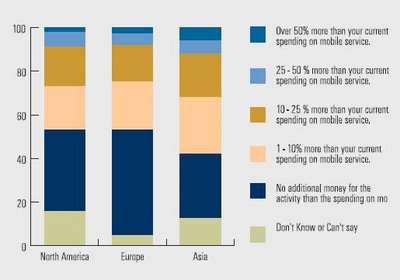How much mobile phone users are willing to pay for enhanced services:

What's more, KPMG discovered that the mobile users who are willing to pay more fall into different usage segments: "Operators need to stride further by segmenting the market, potentially between 'entertainment users' and 'information users.'"
This isn't news to anyone who has been paying close attention to mobile users. Forrester wrote about it in 2002, Jupiter Research wrote about it in 2003, and we found the same thing in our research at PalmSource.
Unfortunately, it doesn't seem like the message has been getting across, because folks like Reuters and the Financial Times are treating the report as important news. That's okay with me -- the more repetition the story gets, the better the chance that it'll finally sink in.
The other notable part of the report was its commentary on business models. The report noted that since different people want different things, operators can't put themselves in the business of dictating what features customers will want:
"Beware of the 'killer app' trap....The opportunity to serve media-hungry consumers is there for the taking, but...those carriers that try to 'wall in' the types of services they offer - or hang their hopes on one particular application or service - are likely to fail to meet customer expectations....Carriers will not be able to meet customer needs alone - thus the importance of sharing their customers' wallets with other partners."
In other words, the right business model is the one employed by NTT DoCoMo in iMode – open your network to independent developers, let them offer whatever apps and services they want, and take a cut of the developers' billings. Seems obvious, but most operators are still trying to do all the thinking for their customers.
Even though the findings of the survey aren't revolutionary, I think the whitepaper is a worthwhile read. It summarizes the key issues better than just about any single document I've seen.
It will be interesting to see how Voda's sale of its Japanese operations to Softbank will affect the Japanese mobile market.
ReplyDeleteA venture capital company with no legacy in mobilecoms might be interested in only utilizing the network to full potential and let others (MVNOs) take care of customer acquisition and marketing efforts.
I agree, timso.
ReplyDeleteBetween the Softbank acquisition and the new operators now being authorized by the Japanese government, it's going to be fascinating to see what happens.
The new Japanese operators are yet another huge story in the Asian telecom market that's not getting much coverage in the US.